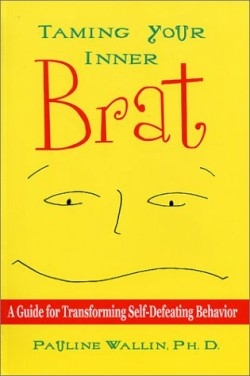Taming Your Inner Brat
A Guide for Managing Self-Defeating Behavior
Nothing surpasses the effectiveness of a metaphor for burning an image into the brain. An excellent way to appeal to a visual generation of self-help readers is to use the concept of an ?inner brat,? to describe the irrational force within everyone that, left untamed, can hinder goals, cause unhappiness, and ruin lives.
That’s the premise of clinical psychologist Wallin, who uses “the inner brat” as a convenient label for the repository of thoughts, feelings, and behaviors left over from childhood. When allowed to take charge, the inner brat can bring on disruptive and destructive behavior due to the raw emotional impulses fueling it. Everything from hissy fits to addictive behavior can be attributed to this narcissistic imp whose goal is immediate gratification. Wallin gives plenty of examples of the brat in action, such as the nag, the martyr, the whiner, and the smolderer, while also offering a plan for self-discipline through mental and behavioral changes.
Using cognitive psychology as ballast, Wallin believes that individuals have “plenty of conscious awareness and capacity for self-direction.” She explains that she uses the concept of the inner brat to help people gain some distance or objectivity in dealing with their problems by isolating less admirable qualities to a separate part of the self, even suggesting they give it a name.
Continuing a positive trend in the self-help field, her approach emphasizes responsibility rather than victimization. Wallin believes that as a result of years spent blaming others, “we evolved into a nation of whiners and complainers” whose support groups became nothing more than “pity parties.” Her suggestions, delivered in a crisp, take-no-prisoners style, are offered to readers now looking for ways to develop the self-awareness and discipline needed to overcome self-defeating and destructive behavior.
Although it’s no bellwether, the book does present cutting-edge research. For example, no one can come away unchanged from her distillation of Roy Baumeister’s research about self-control. The study shows people actually become mentally fatigued while controlling their behavior, which makes them more vulnerable to their destructive impulses. “The more you focus on control, the less control you have,” she writes, adding that mental strength can nonetheless be built up just as physical strength can.
Readers may well exile their inner brats to a corner when they finish this no-nonsense plan for change.
Reviewed by
Judy Hopkins
Disclosure: This article is not an endorsement, but a review. The publisher of this book provided free copies of the book to have their book reviewed by a professional reviewer. No fee was paid by the publisher for this review. Foreword Reviews only recommends books that we love. Foreword Magazine, Inc. is disclosing this in accordance with the Federal Trade Commission’s 16 CFR, Part 255.

